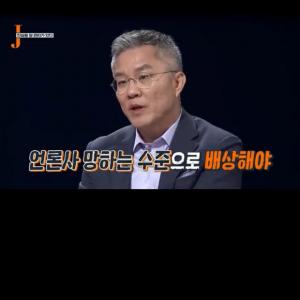Member of the Open Democratic Party, Choi Kang-wook, proposed the most threatening amendment to the media on the 4th among the amendments to the Media Arbitration Act initiated by the 21st National Assembly. At a press conference on the 5th, Congressman Choi said, “While the freedom of the press has been guaranteed excessively, the relief of the victims’ rights has been under-protected,” and stipulated the bill as the “Press Reform Act.”
In the revised bill, “Infringement on moral rights or damage to property due to reports has increased more than in the past, but corrections, objections, requests for future reports, mediation, arbitration, or recommendations of the media arbitration committee are insufficient to remedy damages.” He pointed out that, “There is a criticism that the arbitration committee composition is advantageous to the media, with the rest of the members except judges and lawyers as’press-related workers’.”
According to the amendment, the current media arbitration committee will be replaced by the’Press Committee’ belonging to the Ministry of Culture, Sports and Tourism, and will have a standing member. If a relief request is made, the media committee can determine the infringement and impose a corrective order or compulsory performance fee. A’judgment department’ was established in the press committee, an investigator was placed in the secretariat, and a procedure for expressing opinions was prepared. The number of members has been increased from 90 to 120, and the number of members with experience in the field of human rights and media surveillance for more than 10 years is organized to be at least one-seventh of the number of arbitration members.
When a victim’s request for relief is filed, the media committee may interrogate the parties concerned, and the media committee may impose a performance compulsory fee of not more than 20 million won to media companies that do not comply with the corrective order. Until the corrective order is implemented, the imposition may be repeated up to four times. This is an all-out change in which the media arbitration committee’s role, where’arbitration’ is the core, is changed to’determination of infringement’ for effective damage relief from media reports, and means that the media committee acts as a court. Immediately, criticism is expected to come out of media groups as “a censorship body that blocks reports of criticism of the government.”

The most controversial topic is the’punitive damages’ standard. The amendment is △In the case of serious infringement of a person’s honor, rights, and personal rights due to media coverage, etc.△When the profits obtained from the media coverage are expected to be greater than the amount of damages borne by it △In the process of reporting, etc. If the facts were arbitrarily selected or if a reporter was violated, it was judged that’the media, etc., have the purpose of slandering’, which is the basis for punitive damages.
In addition, according to the amendment, when the court calculates the amount of punitive damages, △ the degree of false recognition of the media, etc. △ the extent of the damage △ tangible and intangible profits acquired by the media, etc. △ The period and number of reports of the same or similar media △ Duration of the media, etc. And property status, △the extent of efforts to relieve damages by the media, etc., △in case the media, etc., has received criminal or administrative punishment due to media reports, etc.
The important point here is the’profit acquired by the media, etc.’ in the process of calculating punitive damages.If you look at the amendment, the total number of days from the date of the press release to the date of deletion is multiplied by the average daily sales of the media company, etc. I decided to make it. For example, the Chosun Ilbo’s total sales in 2019 amounted to 299.1 billion won. Dividing this by 365 days, the average daily sales is about 895 million won. If the report in question was deleted after 5 days, the Chosun Ilbo estimates the profit from the report at about 4 billion won. Existing laws related to punitive damages were 3 to 5 times the actual amount of damage, but in the case of this amendment, the greater the possibility that the punitive compensation amount will rise in proportion to the larger media companies.

Rep. Choi Kang-wook said, “Since the act of producing and distributing fake news by the media motivates the pursuit of social and economic interests, if the profits obtained from fake news are deprived, the motive for spreading fake news can be removed.” The core of this amendment is to set the sales of media companies as the basis for calculating major punitive damages, so it can be seen that the larger media companies are aiming for fatal punishment. Earlier, it was pointed out that the press and human rights centers should consider the sales of media companies in the calculation criteria for punitive damages.
Kim Jin-ae, a member of the Open Democratic Party, who attended the press conference on the day said, “Even if this very strong amendment to the Media Arbitration Act is passed, the problems of the media are still not resolved.” “The media is acting as a power broker. He is not an elected office, but he is working hard on politics and policies. Someone was convicted of writing an internship certificate at his law office, but why doesn’t he bring a question to the court that has not even prosecuted the allegations of sexual forgery of Na Kyung-won’s children? Why doesn’t the media keep common sense?”
Copyright © Media Today, unauthorized reproduction and redistribution are prohibited.
